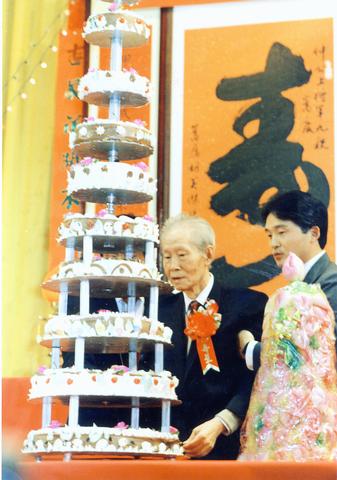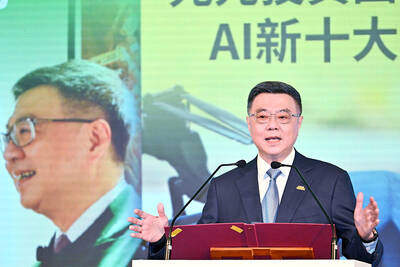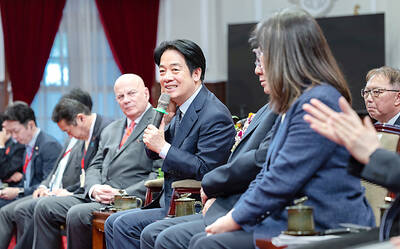A document discovered recently in a safe at the Control Yuan shows that General Sun Li-jen (
Historians have called Sun the greatest Chinese military officer of the 20th century. Fearing political rivalry, however, the general was placed under house arrest by Chiang Kai-shek (
Last August the Control Yuan asked Chu -- who is a research fellow at the Institute of Modern History at Academia Sinica -- to re-investigate Sun's case.

FILE PHOTO
According to Chu, the document, which was written by a special investigation team under the Control Yuan in October 1955, shows the Control Yuan was not convinced that Sun was involved in any mutiny. The Control Yuan also believed Sun's subordinates were innocent.
According to the document, the signatures on Sun subordinate Kuo Ting-liang's (
That led the members of the investigation team to write a letter to Chiang, which concluded: "It is impossible for General Sun to start a mutiny against the government."
The Control Yuan, however, was immediately pressured by high-level government officials, saying that no public announcement about the investigation would be allowed.
Sun's case had languished ever since. According to Chu, the investigation file on Sun's case was meddled with. "Many key words or sentences in the file were erased," Chu said.
The recently discovered document is original and is therefore valuable evidence, Chu said.
Chu said he chose to reveal the findings yesterday because it was the 100th anniversary of Sun's birth. He suggested the Control Yuan publish the original document to clear Sun's name.
Sun, born in 1900 in Anhui Province (安徽省) , was a graduate from the prestigious Virginia Military Institute. Fighting against the Japanese from 1936 to 1945, Sun became known as "The Ever Victorious General." He was also awarded the Order of the British Empire in 1942 for rescuing 7,500 British soldiers in a battle.
After the KMT lost the civil war with the Communists and fled to Taiwan, Sun was promoted to commander (
The troops became a mainstay for the KMT and loyal to Chiang and his son. Sun was later promoted to head of the Army General Headquarters. In 1955, however, Sun's subordinate, Kuo Ting-liang, was accused of treason and was arrested. Sun was forced to resign his post and was put under house arrest the same year.
Sun's family and friends, as well as some local media, tried for years to redress what they saw as a miscarriage of justice.
After Chiang Ching-kuo's death in 1988, the Control Yuan decided to re-investigate Sun's case. Only two months later, on March 20, then Minister of National Defense Cheng Wei-yuan (鄭為元) officially announced that Sun was a free man. Two years later Sun died at his house in Taichung on Nov. 19, 1990.

Two US House of Representatives committees yesterday condemned China’s attempt to orchestrate a crash involving Vice President Hsiao Bi-khim’s (蕭美琴) car when she visited the Czech Republic last year as vice president-elect. Czech local media in March last year reported that a Chinese diplomat had run a red light while following Hsiao’s car from the airport, and Czech intelligence last week told local media that Chinese diplomats and agents had also planned to stage a demonstrative car collision. Hsiao on Saturday shared a Reuters news report on the incident through her account on social media platform X and wrote: “I

STILL ON THE TABLE: The government is not precluding advanced nuclear power generation if it is proven safer and the nuclear waste issue is solved, the premier said Taiwan is willing to be in step with the world by considering new methods of nuclear energy generation and to discuss alternative approaches to provide more stable power generation and help support industries, Premier Cho Jung-tai (卓榮泰) said yesterday. The government would continue to develop diverse and green energy solutions, which include considering advances in nuclear energy generation, he added. Cho’s remarks echoed President William Lai’s (賴清德) comments in an interview last month, saying the government is not precluding “advanced and newer nuclear power generation” if it is proven to be safer and the issue of nuclear waste is resolved. Lai’s comment had

‘BUILDING PARTNERSHIPS’: The US military’s aim is to continue to make any potential Chinese invasion more difficult than it already is, US General Ronald Clark said The likelihood of China invading Taiwan without contest is “very, very small” because the Taiwan Strait is under constant surveillance by multiple countries, a US general has said. General Ronald Clark, commanding officer of US Army Pacific (USARPAC), the US Army’s largest service component command, made the remarks during a dialogue hosted on Friday by Washington-based think tank the Center for Strategic and International Studies. Asked by the event host what the Chinese military has learned from its US counterpart over the years, Clark said that the first lesson is that the skill and will of US service members are “unmatched.” The second

STANDING TOGETHER: Amid China’s increasingly aggressive activities, nations must join forces in detecting and dealing with incursions, a Taiwanese official said Two senior Philippine officials and one former official yesterday attended the Taiwan International Ocean Forum in Taipei, the first high-level visit since the Philippines in April lifted a ban on such travel to Taiwan. The Ocean Affairs Council hosted the two-day event at the National Taiwan University Hospital International Convention Center. Philippine Navy spokesman Rear Admiral Roy Vincent Trinidad, Coast Guard spokesman Grand Commodore Jay Tarriela and former Philippine Presidential Communications Office assistant secretary Michel del Rosario participated in the forum. More than 100 officials, experts and entrepreneurs from 15 nations participated in the forum, which included discussions on countering China’s hybrid warfare